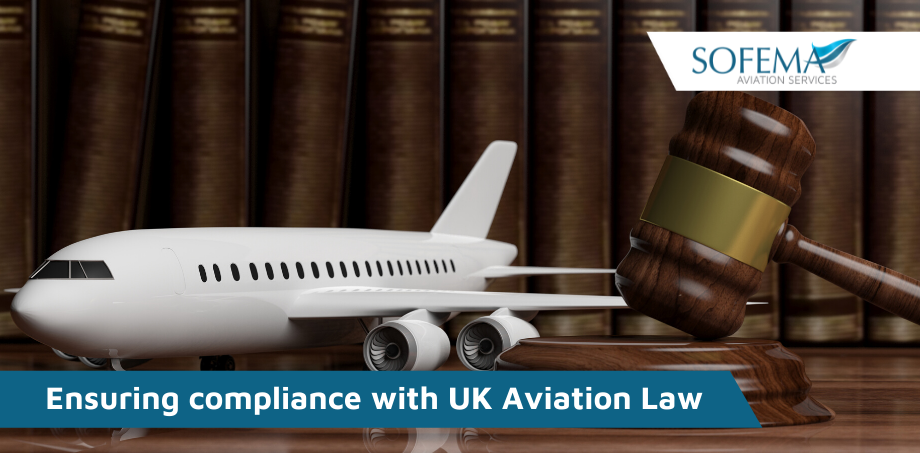Sofema Aviation Services (SAS) www.sassofia.com considers applicable criteria related to Ensuring compliance with UK Aviation Law.
Since the UK fully left the European Union, after the end of the UK/EU Agreement transitional period on 31 December 2020, the law that applies to aviation rights and obligations is now all UK law and includes the retained EU Regulations, as amended by an increasing amount of UK law.
EU regulations as published on EU web pages are not an accurate presentation of the law that applies in the UK.
Some CAA website pages, publications and application forms will continue to refer to EU law or provide links to EU law websites, including the European Union and EASA. Where references to EU law are made, they now relate to those laws as retained (and amended in UK domestic law) under the European Union (Withdrawal) Act 2018. There is a rolling programme of updates underway to replace these references.
Please note that EU law no longer applies to the UK, and links to any EU web pages will not be an accurate description of your obligations or rights under UK law.
We have published the law that applies on a new site at info.caa.co.uk/uk-regulations
The CAA adopted the version of Acceptable Means of Compliance (AMC), Guidance Material (GM), Certification Specifications (CS) adopted by EASA up to 31 December 2020, but has since adopted amendments to that AMC, GM and CS.
- CAA procured versions of UK aviation law currently in force.
- The CAA adopted versions of the law do not contain the statutory forms. They are available to view and download using the Forms link in the menu on the left-hand side of this page.
- The AMC, GM, CS and other information applicable to the UK registered aircraft, pilots, aircraft engineers, other persons involved in UK aviation and organisations.
- UK AltMoC proposed and accepted by CAA prior to 31 December 2020 continues from 1 January 2021 to be meant by which the requirements in the applicable EU Retained legislation, now UK law can be met. This AltMoC is published in CAP 1721.
Important Note – Stakeholders should no longer refer to EU or EASA websites for a description of their rights and obligations under Aviation law (including AMC, GM, CS and other information) as this may be out of date from 1 January 2021 either because the UK position has changed or because the EU or EASA position has changed.
965/2012 is available as CAP2025A00: Air Operations Regulation 965/2012
1321/2014 is available as CAP2022A00: Continuing Airworthiness Regulation
CAP2021A00: Initial Airworthiness Regulation 748-2012
CAP2021A09: Initial Airworthiness Large Aeroplanes CS-25 – Amendment 26 (Note EASA is at Amendment 27)
List of UK Airworthiness Directives from 1st Jan 2021
UK-EU transition – Changes from 1 January 2023
From 1 January 2023, the UK will no longer be able to recognise EASA-issued certificates, approvals and licences for the operations and/or maintenance of UK registered aircraft. The CAA is encouraging holders of EASA approvals and personnel licences to begin the process of obtaining their UK equivalents ASAP.
Businesses who fail to apply for UK approvals and licences by 31 December 2022 will be unable to work and operate in the UK or support the training of UK licence holders.
The European Union (Withdrawal) Act 2018, as amended and supplemented by the Aviation Safety (Amendment etc.) (EU Exit) Regulations 2019 included some regulatory arrangements that allowed for the recognition of EASA approvals and licences for a period of two years from the 31 December 2020 when the UK left the EU.
These arrangements were put in place to maximise stability for passengers, the aviation and aerospace sectors. The recognition will end on 31 December 2022, meaning that the CAA will no longer be able to recognise all EASA certificates, approvals and licences.
This will have implications for different sectors of the aviation industry.
If you fall under one of these categories, you must apply to the CAA for UK-issued licences and approvals to continue working and operating UK registered aircraft from 1 January 2023:
- Pilots with EASA licences operating UK registered aircraft
- Engineers with EASA licences, maintaining UK registered aircraft within the UK
- Maintenance organisations with EASA approvals maintaining UK registered aircraft
- Part CAMO/CAO organisations supporting the maintenance of UK registered aircraft
- Air carriers holding Third Country Operators (TCO) certificates
There are presently no signs that the Trade and Cooperation Agreement (TCA) between the UK Government and European Union will be expanded to encompass aviation maintenance. and the aforementioned arrangements will have no effect from 1 January 2023.
Next Steps
Follow this link to our Library to find & Download related documents for Free.
Sofema Aviation Services www.sassofia.com and Sofema Online www.sofemaonline.com provide Classroom, Webinar & Online Training. For additional details or if you have any questions, please email team@sassofia.com
Tags:
Guidance material (GM), TCO, UK Airworthiness Directives, Initial Airworthiness Large Aeroplanes CS-25 – Amendment 26, Initial Airworthiness Regulation 748-2012, Continuing Airworthiness Regulation, Air Operations Regulation 965/2012, AltMoC, Aicraft Maintenance, Aviation Law, aviation, Acceptable means of compliance (AMC), Certification specifications (CS), Part CAMO, UK, Licensing, EASA, CAMO, CAA




